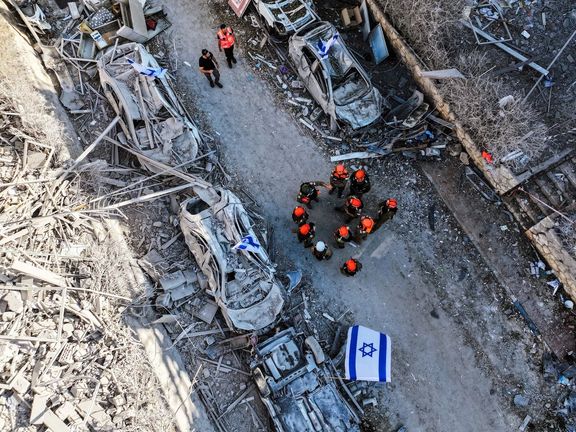Iran’s 'eye for an eye' strategy deterred Israel, Revolutionary Guards say

Iran's Islamic Revolutionary Guard Corps (IRGC) said on Wednesday that its retaliation for Israeli strikes during a 12-day war in June has deterred its arch-foe.

Iran's Islamic Revolutionary Guard Corps (IRGC) said on Wednesday that its retaliation for Israeli strikes during a 12-day war in June has deterred its arch-foe.
IRGC spokesman Brigadier General Ali-Mohammad Naeini told Tasnim News that the depth of Iran’s response caused Israel to reconsider its war aims.
“It was an eye for an eye, one for one, with precision. And when we struck the minus-one level of a 31-storey building, it showed our intelligence was complete and our missile attacks were carefully planned,” Naeini said.
“When the enemy struck our research center, we hit theirs. When they attacked our refinery, we immediately struck their refinery. When they targeted our air base, we wasted no time in hitting their air base,” Naeini added.
A surprise Israeli military campaign on June 13 targeted military and nuclear facilities in Iran. Iran responded by launching drones and ballistic missiles at Israel.
On June 22, the United States joined the conflict, striking three major nuclear sites at Fordow, Natanz and Isfahan. A US-brokered ceasefire ended fighting two days later.

Miscalculation of weakness
Naeini said Israel had assumed the surprise attack would devastate Iran, but the outcome showed they had miscalculated.
“The enemy’s assumption in both wars was that Iran had been weakened. They believed Iran had no deterrence, no response capability, and no ability to regain strength,” he said.
He was referring to the Iran–Iraq War (1980-1988), fought between the neighbours led by Saddam Hussein and Ayatollah Khomeini, which ended with a UN-mediated ceasefire.
“They thought Iran would lose Khuzestan in a short, intense war during the eight-year Sacred Defense, and that in this 12-day war the Islamic Republic would lose its elements of power, leading to unrest, overthrow and even partition," Naeini added. "But the outcome was different.”
Major General Abdolrahim Mousavi, chief of staff of Iran’s armed forces, said on Wednesday that Tehran’s defensive preparations had deterred enemies from launching a new assault.
US and Israeli officials said their strikes aimed to block Iran from developing nuclear weapons.
Britain, France and Germany have triggered the resumption of international sanctions which could take effect within weeks if Iran doesn't accede to their demands on transparency and renewed talks with the United States.
Tehran denies seeking a nuclear bomb and describes the measures as diplomatic blackmail in service of American and Israeli interests.